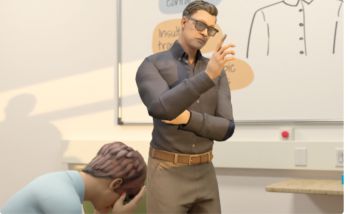Innovative virtual learning module boosts medical students' confidence in handling angry patients
By: Matt Bemment
Last updated: Friday, 14 February 2025

A new study led by researchers at Sussex Health Outcomes and Research Education in Cancer (SHORE-C) at Brighton and Sussex Medical School (BSMS) indicates the potential effectiveness of virtual learning (VL) in enhancing medical students' communication skills, specifically in managing angry patients and relatives. Published in BMC Medical Education, the research highlights how technology-driven learning can complement traditional medical education.
The pilot study, led by Dr Valerie Shilling, Rachel Starkings, and Professor Dame Lesley Fallowfield, involved 20 fourth- and fifth-year medical students who participated in a VL module using either virtual reality (VR) headsets or desktop applications. The module, developed in collaboration with Bodyswaps© and the Royal Society of Medicine, focused on five key skills: recognising anger signals, remaining calm, de-escalating hostile situations, empathising, and applying techniques across different scenarios.
Key findings:
- Students reported a significant increase in confidence across all five communication categories after completing the module.
- Participants appreciated the psychological safety provided by the virtual environment, allowing them to practice without fear of judgment.
- While initial scepticism existed about the realism of VL, post-intervention feedback indicated that most students found the experience more immersive than expected.
- A majority preferred a blended learning approach, combining virtual modules with traditional face-to-face training.
Lead researcher Dr Valerie Shilling, Principal Research Fellow at SHORE-C, said: "This study highlights the potential of virtual learning to provide medical students with tangible, transferable skills for real-world clinical encounters. By integrating VL with traditional teaching methods, we can better prepare future doctors to handle emotionally charged situations with confidence and empathy."
Professor Dame Lesley Fallowfield, Professor of Psycho Oncology at SHORE-C, was the chief academic consultant on the module, which she helped to develop in 2023. She added: “Communicating with patients is a core clinical skill, but it’s not something healthcare professionals get much formal training in. We know that healthcare professionals regularly face increased levels of verbal abuse from patients and medics often say that handling angry patients and relatives is one of their greatest challenges. Learning how to diffuse anger is an important skill, irrespective of the setting.”
Future research
While the results are promising, the study’s authors emphasise the need for larger-scale research to evaluate the long-term retention of skills learned through VL and their transferability to actual clinical practice. Future studies will compare VR modules with traditional teaching methods to determine the most effective combinations for comprehensive medical training.
The pilot project was supported by Thompson Family Scholarships through the Royal Society of Medicine and highlights BSMS's commitment to pioneering educational innovations that prepare future healthcare professionals for the evolving demands of patient care.
